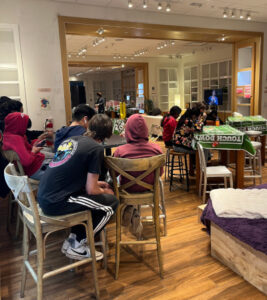
For most youth, sports are a learning opportunity.* Adults expound on the obvious lessons: preparation, determination, cooperation. When it comes to the alcohol industry, however, there are hidden lessons: normalization, intention, brand recognition. Alcohol ads and branding in media favored by youth have a demonstrated impact on how early and how enthusiastically kids start drinking. The converse question is, what has an impact on what gets kids to prefer not to drink?
The Super Bowl serves as a flashpoint for this tension. As the most-watched television block every year, the Bowl draws millions of viewers. Since Super Bowl parties are home-based, celebratory events, many of these viewers are underage; we estimate this year’s bowl reached 27.6 million viewers under 18 years of age. With the eyeballs come the ad dollars, and the NFL has long boasted robust connections with Big Alcohol. Until last year, Anheuser-Busch InBev—the makers of Budweiser and Bud Light, among many, many, many, many other brands—had a long-running sponsorship deal with the league allowing plum placement for its campaigns. But now most other major producers have jumped in as well, with paid spots running the gamut from sly to inept to cynically exploitative.
“Really, the most responsible alcohol ad is one shown somewhere only adults are watching,” said Michael Scippa, Public Relations Director for Alcohol Justice. “But when you get cartoon characters, superheroes, social media influencers—then it’s really obvious you’re not trying to get adults. You’re not trying to get college students. You’re trying to get kids.”
Alcohol Justice has long stood alongside many national and international groups calling to Free Our Sports, and in particular Free The Bowl, and dry up the ubiquitous alcohol money in professional athletics. This year, however, AJ did more—it created an environment for the kids to enjoy the big game without the many messages (both corporate and social) normalizing reckless consumption.
Through partnership with San Rafael’s Karma Club, Alcohol Justice sponsored a Super Bowl watch party. Over 40 kids from the San Rafael area came out, to watch the game in a comfortable and safe space centered on them. Alongside the must-haves—pizza, sodas, screens, Niners gear, and music—was the guiding rule: every time you spot an alcohol ad, the TV gets muted and there’s a raffle for prizes on the spot.
“It’s funny,” said David Thompson, Youth for Justice Program Director, “you worry about, ‘are we going to sensitive the kids to the ads? Are we going to make them like them?’ But the moment the ad started, they just shouted it down, killed the sound, and completely ignored it.”

As it turns out, this Super Bowl was one of the ad-lightest in recent memory. Five ads ran, no brand ran multiple ads. More tellingly, nearly every ad leaned into celebrity endorsements (the obligatory, treacly Budweiser campaign notwithstanding), often with celebrities such as LL Cool J who have limited if any youth appeal. The reasons for this wide dialing back of the Big Alcohol onslaught bear further analysis, but for Free Our Sports advocates, the signs seem promising. Not only has U.S. society, inspired perhaps by Dry January, broadly pivoted into more deliberative approaches to alcohol consumption, but the industry’s experience trying to draw in youth via was nothing more than catastrophic.** Together, these may have created a gun-shy industry, but that discounts the contributions of an increasingly savvy, self-advocating youth.
“These kids are razor sharp,” said Thompson. “They have all the smarts to know when they’re being manipulated by these companies. And I think we’re helping them realize it doesn’t have to be that way. They can see it coming, they can talk back to it, they can live free of it.”
The Super Bowl ended in many broken hearts for local fans. But the Super Bowl was just a beginning for the youth of San Rafael. Equipped with a place to engage with their own health and future and things to say to companies that might want to hijack both, they are the ones who will see the Free The Bowl message become reality.
* Sports are a learning opportunity for some adult coaches named Kyle Shanahan, too, at least when it comes to overtime rules.
** The story of Bud Light’s brief support for, and sudden abandonment of, transgender TikTok influencer Dylan Mulvaney should be explored in greater detail. Suffice to say that support for transgender rights is much stronger among younger U.S. residents, as is use of TikTok, and Bud Light itself has always tried to be a youth-oriented brand—to the point where it has, in the past decade, been favored by underage drinkers over even alcopops.
READ MORE – about the movement to Free The Bowl.
